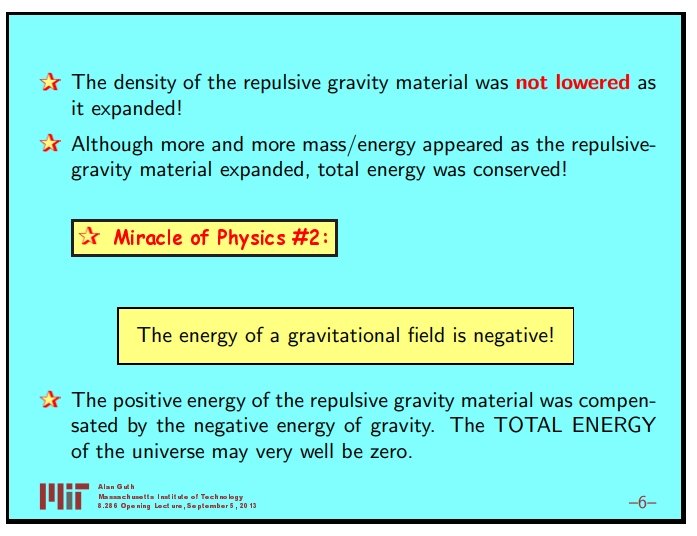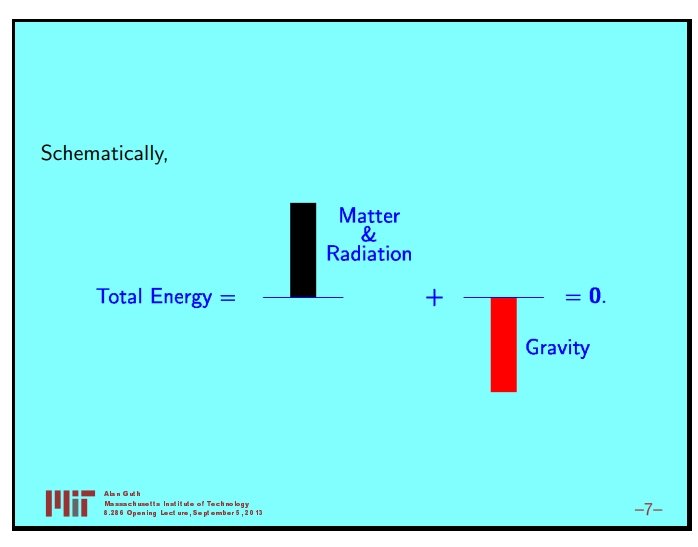

Genady
-
Posts
5178 -
Joined
-
Days Won
52
Content Type
Profiles
Forums
Events
Posts posted by Genady
-
-
3 minutes ago, SergUpstart said:
Are you sure that this frequency standard is absolute? Are you sure that if you move this caesium atom (like an atom of any other chemical element) to a point with a different gravitational potential, its spectrum will not shift?
If this atom is placed in a local gravitational field, especially close to a large mass like black hole for example, its frequency will decrease. That's why I insist in the thought experiment above that the box is away from such bodies. The atom's frequency will stay constant in those conditions.
0 -
Just now, exchemist said:
Are you sure about that? I should have thought that if the metric itself expands, then the dimensions of everything must do so, though the change for points close together would be very small.
Yes, absolutely unconditionally sure. Bounded systems do not expand with cosmological expansion. Galaxies are gravitationally bound.
0 -
6 minutes ago, SergUpstart said:
The thing is that we do not and cannot have absolute standards of distance and time.
To the contrary, we can and we do.
The exact modern definition, from the National Institute of Standards and Technology is: "The second, symbol s, is the SI unit of time. It is defined by taking the fixed numerical value of the cesium frequency ΔνCs, the unperturbed ground-state hyperfine transition frequency of the cesium 133 atom, to be 9192631770 when expressed in the unit Hz, which is equal to s⁻¹." (wiki)
For a standard unit of distance you can take a distance that light covers in one standard unit of time.
0 -
1 minute ago, SergUpstart said:
Will be. As the universe expands, the dimensions of the mirror box will also increase. I.e., the walls of the mirror box are constantly moving in different directions, photons should experience the Doppler effect with each reflection from the walls of the box.
The box keeps its shape and size. The atoms of the material it is made of do not expand, distances between atoms do not expand as the universe expands. The walls of the box do not move relative to each other.
E.g. the distances between far away galaxies increase, but the galaxies themselves do not grow as the universe expands.
0 -
Imagine a box with internal walls covered with mirrors. A light /photon bounces inside the box from mirror to mirror. The box is placed far away from gravitating bodies, somewhere in the homogenous and isotropic universe. As the universe expands, will the light inside the box redshift?
(My answer, No.)
0 -
Just now, exchemist said:
Hmm, do you mean that a glass prism gains mass if you shine a light through it? I struggle to see how that would work, I must admit.
Unless..........you mean that the coupling of the radiation to the medium "lends" some of its energy to it as it passes through, which I guess it does if its refractive index deviates from unity.
No, I just mean mirrors. I take a box with internal walls being mirrors, let light in, say, through a little opening. Light just bounces inside from mirror to mirror (we can close the opening to make sure it doesn't escape). The mass of the box increased.
0 -
18 hours ago, Peterkin said:
We had a German Shepherd once adopted from a home where they spoke only Greek, and he had to re-learn all the commands and signals, as well as how to communicate with two other dogs brought up in our home. He was fluent in six months.
This is surprising. We once had adopted a rottweiler from a foreign speaking family and she had to do the same, except one other dog rather than two. She was fluent in a couple of weeks. She was 2 yo, maybe that was a factor, if your shepherd was older.
It was interesting to observe how the other dog taught her the rules of the house.
0 -
26 minutes ago, exchemist said:
Sort of, ish. Light is not energy of course: it has energy (E=pc = νλ), which can be added to that of an entity that absorbs it, which will then gain mass according to E=mc².
Of course. I should've said "such as that of light" or something similar. Otherwise, yes, this is what I mean.
I have a picture in mind where the light remains light, i.e. is not absorbed in a sense of being converted into something else. It will be there with no mass, but the entity will gain mass still.
0 -
They do "go hand in hand" ( @exchemist) but they are different nevertheless. Energy is additive, mass is not. Energy with no mass, such as light, can be added to something and that something will acquire extra mass.
0 -
I think that - in the right handed coordinates - if the angular momentum of the spinning tube is toward Z and the wind is toward Y then it moves toward X.
0 -
If there were an actual evidence of a real J of N, wouldn't everyone know it by know? Would Church let it go?
0 -
13 minutes ago, Peterkin said:
Experience is continuous, whether you choose to segment and label it or not, but that continuity is naturally segmented into significant events that stand out from the mundane (which is why we recall them). It's the same for dogs and cats and so presumably for other animals.
I think so as well. I just don't see concepts behind this ability, but rather memory, recognition, association, learning, which even a worm with 300 neurons can do.
17 minutes ago, Peterkin said:This selection is not arbitrary; the events are remembered for a reason: they taught us something valuable. We narrowly escaped a bad consequence, or we learned something useful, or we met someone important or won a victory. In the same way, crows learn to recognize a rifle in a man's hand, as horses recognize a carrot or a rope - because something once happened to make these items significant through a human's action. Before humans were invented, crows had to know the difference between a hawk and woodpecker and horses had to distinguish wolves from shrubbery. The experiences of perilous life on this planet are not arbitrary.
Perhaps, 'arbitrary' is a wrong word. What I meant is that this categorization is not universal ("objective"), but rather individual, cultural, temporal, conditional, etc.
21 minutes ago, Peterkin said:English is not the first language - not by a long chalk. It's made up of fragments of at least six previous, fully developed languages. That's why it has so many words, including several for the same concept, because it's retained both the Norman French and the Celtic, both the Latin derivation and the Germanic.
If you want to study the origin and evolution of human language, you'd have to start with something as nearly pure as possible - Icelandic, say, or Tamil - one that has the fewest possible foreign influences. Ideally, you should find an isolated tribe in the Andes or on some island, but I doubt there are many left. Some of the North American native languages could be useful, though they have, of course, influenced one another as well as European occupation.
It is not about evolution of a language or languages, but rather about evolution of brain that allowed a language. There is nothing special about English in this respect. All languages have differences in how they categorize outside world.
English is a first language for a child growing up in an English speaking environment, etc. Later they might learn other languages, and they will have to adjust some concepts because these other languages segment world differently.
31 minutes ago, Peterkin said:I'm curious what led you to this conjecture. Why do you think we alone have language? Why do you think a caribou doesn't categorize such concepts as 'rival', 'foal' 'predator' 'water' and respond to the perception of these items appropriately, it doesn't retain abstract ideas like 'spring - northward' 'my territory - defend' and 'wolf scent - danger'.
There are many aspects to 'language'. Most obvious is a communication tool. Surely other animals have this. Plants and bacteria have it too. However, communication is not the only characteristic feature of a human language. Among others are:
- Displacement; animals seem to communicate only about a given environment at hand; we can refer to past and future times, removed or even not existing places, things, and events
- Cultural transmission; dogs speak dog language and cats speak cat language, but we speak a language that we acquire from the culture we grow up in, i.e. we don't inherit any language, only an ability for a language (I know that some birds and whales learn their songs from others; but without the others, they will sing anyway, just not that good; humans growing without others don't produce any language)
- Productivity; human language is continuously changing, adding new words and structures, is "open-ended", potentially infinite; communication systems of other creatures are essentially pre-set, they have fixed references, they apply the same repertoire in the new situations
There are no indications that other animals have a language with such characteristics.
1 hour ago, Peterkin said:Me, I don't believe there is anything unique in the human body - no radical departure from the mammalian standard, just adaptation, specialization and complexity on top of complexity.
OK, this is a different hypothesis.
0 -
I assume that words in a language represent concepts in the brain. The concepts seem to be discrete categories made up by the brain from a continuous experience, more or less arbitrarily. Here are some examples:
- the English concepts 'shade' and 'shadow' correspond to one concept in Russian, represented by the word 'tien'
- the English concepts 'table' and 'desk' correspond to one concept in Russian, 'stol'
- the English basic color 'blue' doesn't have a corresponding concept in Russian, but is rather covered by two distinct basic color concepts, 'sinij' and 'goluboj'
I hypothesize that other animals perceive and process outside world as a continuous signal, while our brain evolved an ability to 'digitize' the continuous signal and to process it in discrete categories. This ability became a basis for our ability to use language.
0 -
Watch this movie about Russia at the times of Mongol occupation, circa 1400.
0 -
Today I learned a new term: WEIRD societies = Westernized, Educated, Industrialized, Rich, and Democratic.
0 -
3 minutes ago, jday said:
Even so wouldn’t you say that there is potential of energy and regardless of active or inactive the fact that there is “to be”, is something rather than nothing. If the statement was zero and inevitably zero without any counter action to increase then that will conclude as nothing however if there’s a possibility of the nothing becoming something then there has always been a potential to something. @Genady
I do have some idea what 'nothing' and 'something' means, but I don't have any idea what is 'potential for /of /to something'. If you mean that it happened because it could happen, then it seems just circular, i.e. it could happen because it happened.
1 -
6 minutes ago, jday said:
They must’ve been a confusion in the 19 century the SI units were revised and in the 16th century it was once revised again I can link and article if you’d like.
No need, it's ok. They didn't call it SI then, I guess.
0 -
8 minutes ago, jday said:
Throughout the centuries the SI unit has proved to be unreliable in certain situations hence in those situations they decided to improve and change the basic unit system. We base measurements from earth’s properties but given the different and probably infinite possibilities within our universe we base our observations from earths basic units however one size does not fit all. Connecting back to my initial statement I wouldn’t say that measurement itself is an illusion but there are variable factors that change the aspect and how we interpret the information.
"Centuries"? It is only 62 years in existence.
0 -
Here are two slides from Alan Guth's lecture 1 in the MIT class on Early Universe. He has explained there how something can come from nothing while obeying the energy conservation. Don't worry about his use of word "miracle". He uses its meaning as "a very amazing or unusual event, thing, or achievement" (Merriam-Webster)

 0
0 -
When I Heard the Learn’d Astronomer
BY WALT WHITMANWhen I heard the learn’d astronomer,When the proofs, the figures, were ranged in columns before me,When I was shown the charts and diagrams, to add, divide, and measure them,When I sitting heard the astronomer where he lectured with much applause in the lecture-room,How soon unaccountable I became tired and sick,Till rising and gliding out I wander’d off by myself,In the mystical moist night-air, and from time to time,Look’d up in perfect silence at the stars.Perhaps Walt Whitman came to the lecture unprepared. He didn't know how much depth, beauty, perspective he missed.I wonder, who the "learn'd atronomer" was?0 -
-
5 minutes ago, joigus said:
OK. I don't know whether you retracted from your question or from a previous point. But keep in mind the Higgs mechanism is an ad hoc mechanism. Brilliantly insightful, to be sure, but ad hoc nonetheless. IOW: We don't really understand where mass comes from. It's nice to have a multiplet of particles that gives mass to everything else. The Higgs floats around while the Goldstone bosons from the multiplet (not the Higgs, this is not faithfully reflected in the literature) provide mass to all fermions and short-range bosons. But where do the completely disparate mass spectrum comes from? I don't think we've developed a picture in the way that the OP seems to suggest, that mass differences could be explained by means of field self-interaction, and self-interaction alone.
(I retracted an erroneous edit only.) It is correct that all these masses have to be put in by hand. Finding the Higgs boson supports the mechanism, nevertheless. (I don't think the OP had any of this in mind. It asked about a mass of the field.)
0 -
19 minutes ago, joigus said:
Somebody would think it's a weak confirmation, but here's one: No charged particle with zero rest energy (relativistic mass) has been found. So the EM field has inertia. Always.
To which I will add a prediction: No charged particle with zero rest energy (relativistic mass) will ever be found.
It would work for me. But, how it reconciles with the SM where particles get their mass from interaction with the Higgs field?
Edit: Retracted.
0 -
1 minute ago, joigus said:
Now that I think about it, @exchemist wasn't necessarily talking about the electron...
For some reason, I was thinking about the electron.
Yes, I wondered where the subject has changed from 'field' to 'electron'. And with no input from the OPer.
0


Cosmological redshift, thought experiment
in Astronomy and Cosmology
Posted
The metric is a local thing, there is no one universal metric of the universe. The cosmologically expanding metric is metric of a homogenous isotropic space. It works for places which are far away from inhomogenous gravitational sources and also for scales at which the universe 'becomes' homogenous and isotropic. I think this scale is of the order of 100 Mpc.
In fact, we observe today galaxies at redshift of order 1 and more. They would be twice or more larger than the galaxies close to us. But they are not.